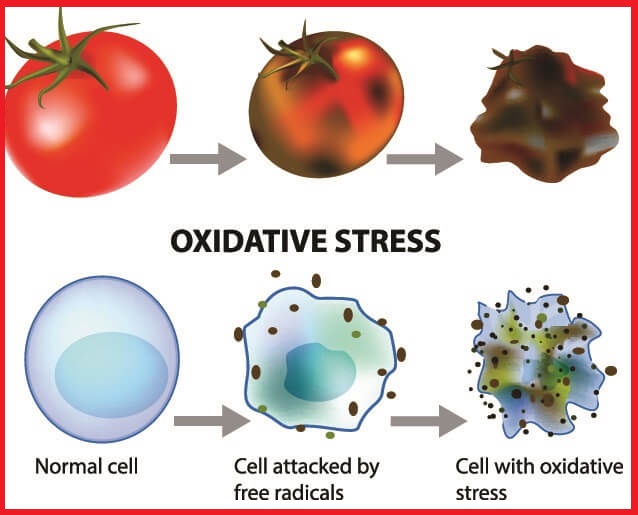UNDERSTANDING OXIDATIVE STRESS: EFFECTIVE WAYS TO COMBAT IT.
Oxidative stress occurs when there’s an imbalance between the production of reactive oxygen species (ROS) and the body’s ability to counteract their harmful effects through antioxidants. ROS are yunaturally produced as byproducts of various cellular processes, and they can damage cells, proteins, DNA, and lipids if their levels become too high.
Causes oxidative stress :
Factors such as pollution, smoking, excessive alcohol consumption, poor diet, and stress can contribute to oxidative stress by increasing the production of free radicals.
Effects of oxidative stress on the body :
Oxidative stress is linked to various health issues including inflammation, aging, neurodegenerative diseases, cardiovascular diseases, and cancer.
Oxidative stress effect aging process :
Oxidative stress is thought to contribute to the aging process by damaging cells and DNA over time, leading to cellular dysfunction and age-related diseases.
Medical conditions associated with oxidative stress :
oxidative stress is linked to various conditions including Alzheimer’s disease, Parkinson’s disease, cardiovascular diseases, diabetes, and certain cancers.
Com-batting oxidative stress involves implementing strategies to reduce ROS production and enhance the body’s antioxidant defenses. Here’s a detailed overview of effective ways to combat oxidative stress:
Antioxidant-Rich Diet:
Consuming a diet rich in antioxidants helps neutralize excess ROS. Foods high in antioxidants include colorful fruits (berries, citrus fruits), vegetables (spinach, broccoli), nuts (almonds, walnuts), and whole grains.
Vitamins and Minerals:
Vitamins like C and E, along with minerals like selenium and zinc, act as antioxidants. These can be obtained through diet or supplements, but it’s important not to exceed recommended doses.
Polyphenols:
Found in foods like green tea, red wine, dark chocolate, and certain fruits, polyphenols have potent antioxidant properties that can combat oxidative stress.
Omega-3 Fatty Acids:
Found in fatty fish, flax seeds, and walnuts, omega-3 fatty acids help reduce inflammation and oxidative stress.
Regular Exercise:
Moderate exercise promotes the production of endogenous antioxidants and reduces oxidative stress. However, excessive or intense exercise can lead to oxidative damage, so moderation is key.
Adequate Sleep:
Sleep allows the body to repair and regenerate cells, helping to mitigate oxidative stress. Aim for 7-9 hours of quality sleep per night.
Stress Management:
Chronic stress contributes to oxidative stress. Techniques such as meditation, deep breathing, and yoga can help manage stress and reduce its impact on the body.
Hydration:
Staying well-hydrated supports detoxification and reduces oxidative stress. Aim to drink sufficient water throughout the day.
Limiting Alcohol and Smoking:
Excessive alcohol consumption and smoking increase ROS production. Cutting back or quitting these habits can significantly reduce oxidative stress.
Environmental Factors:
Minimize exposure to pollutants, toxins, and excessive sunlight, as these can increase oxidative stress.
Supplements:
Consult a healthcare professional before taking antioxidant supplements, as excessive intake can have adverse effects.
Intermittent Fasting:
Some studies suggest that intermittent fasting can enhance the body’s natural antioxidant defenses and reduce oxidative stress.
Earthing remove oxidative stress:
Earthing act like Antioxidant .Scientific research on Earthing is limited and mixed. When the body get in touch with earth ,electron move from earth to our body and neutralize free radical atom full filling the requirement of electron.This action is same as the action happen consuming Antioxidant food material .While some studies suggest potential benefits like improved sleep and reduced inflammation. Walking barefoot or spending time outdoors can certainly have positive effects on mental well-being and physical activity.
It’s important to note that while Earthing may be a part of a holistic approach to health for some individuals. you can explore walking barefoot outdoors, spending time in nature, or simply incorporating more outdoor activities into your routine.
It’s important to note that a balanced approach is key. While antioxidants are beneficial, excessive supplementation can be harmful. Consulting a healthcare provider before making significant changes to your diet or lifestyle is advisable, especially if you have underlying health conditions.
S P E C I A L .
- Include 500 gm fruits and 500gm vegetable in raw form daily in your diet to combats oxidative stress.
- Get in touch with earth for 4 hour daily.most of free radical remove .Oxidative stress combat automatically.
3. Exercise 30 minute a day prevent reactive oxygen species.
FAQ :
Q: What is oxidative stress?
A: Oxidative stress is an imbalance between the production of harmful molecules called free radicals and the body’s ability to counteract their damaging effects.
Q: How can oxidative stress be combated?
A: Antioxidants, found in foods like fruits, vegetables, and nuts, help combat oxidative stress by neutralizing free radicals. Regular exercise, reducing stress, getting enough sleep, and avoiding harmful substances also play a role.
Q: What are some examples of antioxidants?
A: Examples of antioxidants include vitamins (such as C and E), minerals (selenium, zinc), and compounds like flavonoids and polyphenols found in foods like berries, dark chocolate, and green tea.
Q: Can supplements help combat oxidative stress?
A: While supplements can provide additional antioxidants, it’s generally better to obtain antioxidants from a balanced diet rather than relying solely on supplements.
Q: Is all oxidative stress harmful?
A: Some level of oxidative stress is natural and necessary for normal cellular functions. It’s when there’s an excess of oxidative stress that it becomes harmful and leads to cellular damage.
Q: Can lifestyle changes effectively reduce oxidative stress?
A: Yes, adopting a healthy lifestyle that includes a balanced diet, regular exercise, stress management, and avoiding harmful habits can help reduce oxidative stress and its negative effects on the body.
{NUTRITION LIFE CIRCLE} 

My Self Hari singh choudhary
S.N.H.S. Dip.(Holistic nutrition), London, S.N.H.S. Dip. (Advanced Nutrition), London, S.N.H.S. Dip. (Holistic Pain Management), London, S.N.H.S. Dip. (Nutrition for Age 50+), London, S.N.H.S. Dip. (Plant-Based Nutrition), London, S.N.H.S. Dip. (Vegetarian & Vegan Nutrition,) London, Certified Diabetes Educator’s (INDO-VIETNAM MEDICAL BOARD, Associate member of The International College of Holistic Medicine, England.
NATURAL DISEASE ERADICATION
[ NUTRITION THERAPY ]
For Business inquiry:-
Email: nutritionlifecircle@gmail.com
WhatsApp Number: +91 9425090558
